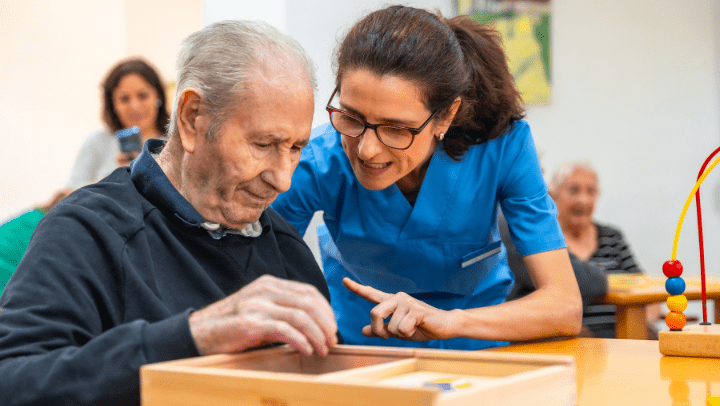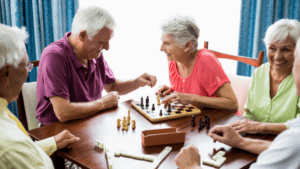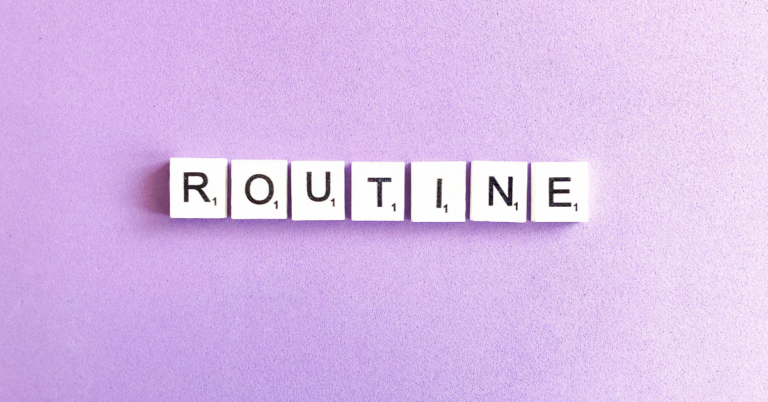
Research shows brain-stimulating activities can boost thinking abilities a lot in older adults and help reduce cognitive decline, even though dementia has no cure. Studies have shown activities like Mahjong, card games and board games can boost cognitive function in adults aged 70 and above.
Brain games play a vital role in cognitive health for people seeking memory care with dementia support in Pewaukee, WI. Science proves these engaging activities benefit early and middle-stage dementia patients. They help improve short-term memory, reaction time and problem-solving abilities. Heritage Court Waukesha understands dementia leads to cognitive decline. The right mix of brain-stimulating activities helps maintain mental sharpness and boosts quality of life.
Understanding Brain Games and Cognitive Health
Brain training games strengthen neural connections through repeated cognitive challenges. Research reveals that our brains process information two to three times slower at age 60 compared to age 20. This processing becomes five to eight times slower by age 80. These mental exercises are vital to keep our cognitive health strong.
The science of brain games revolves around synaptic plasticity—knowing how to create new neural pathways and adapt to cognitive challenges. Studies have shown that regular mental exercises can improve memory loss by 30 to 50 percent. A groundbreaking 10-year study revealed that people who participated in computerized brain training had a 33 percent lower risk of developing dementia. This protection jumped to 48 percent for those who completed more than 10 training sessions.
At our community, we focus on brain games that target vital cognitive functions like working memory, executive function, processing speed and verbal memory. These games build new synaptic connections and create a cognitive reserve that protects against mental decline. People looking for memory care should know that brain training works best with other healthy lifestyle choices.
Research shows these cognitive exercises build stronger neural networks by activating specific brain circuits. Regular practice strengthens these connections and helps maintain mental sharpness while potentially slowing cognitive decline. Our brain’s amazing ability to form new neural pathways means that brain games can benefit cognitive health throughout our lives.
Most Effective Brain Games for Memory Enhancement
Research shows that certain brain games can boost cognitive function remarkably well. Seniors who played card games showed better cognitive abilities than non-players. A newer study found that digital crossword puzzles helped people with mild cognitive impairment think better. These are some ideas for brain-boosting activities:
- Word-Based Games: Crosswords and word searches help build vocabulary and verbal memory
- Strategic Board Games: Chess and checkers boost problem-solving and logical reasoning
- Memory-Training Apps: Programs like Lumosity and Peak boost attention and motor speed through individual-specific training
Bridge and solitaire are great card games that work well because players must think strategically while using short-term memory. These games are the foundations of our daily activities calendar.
Creating a Daily Brain Training Routine
Your journey toward cognitive wellness begins when you set aside dedicated time to train your brain. Scientists have found that your memory, attention and thinking skills improve with just 10-15 minutes of daily mental exercises.
We recommend a structured brain training schedule. Instead of long sessions, break your routine into smaller, manageable segments. For example, you could solve a crossword puzzle during your morning coffee or play memory games after lunch.
Brain exercises naturally fit into your daily tasks. Your cognitive function gets a boost when you stand during phone calls or take new routes while running errands. Studies show that quick physical movements between routine tasks lead to better energy and mental performance.
Your daily brain training routine should include:
- Morning mental warm-ups with word games
- Midday strategy exercises
- Evening wind-down activities with calming puzzles
- Social brain games with friends or family members
Regular, short mental exercises produce better results than long, irregular sessions. Your training should become progressively challenging to keep you motivated and alert. Seniors benefit significantly from mixing physical activities with brain exercises. Studies confirm that regular movement boosts executive functioning abilities and improves inhibition, working memory and cognitive flexibility.
Enhance the Quality of Your Life
Brain games are powerful tools that maintain cognitive health and help reduce memory loss. Dementia creates ongoing challenges, but regular mental exercises can substantially boost thinking abilities and protect against cognitive decline.
Success depends on selecting the right mix of activities and following a regular schedule. Games like chess, crosswords and specialized memory-training apps play vital roles to build cognitive reserves and strengthen neural pathways. Heritage Court Waukesha offers memory care for seniors that maximize these cognitive benefits. Call (262) 542-3434 to schedule a tour and learn more about our innovative approach.
Note that protecting your cognitive health is an ongoing trip. Just 10-15 minutes of daily brain training can make a meaningful difference in maintaining mental sharpness and enhancing your quality of life for years ahead.






